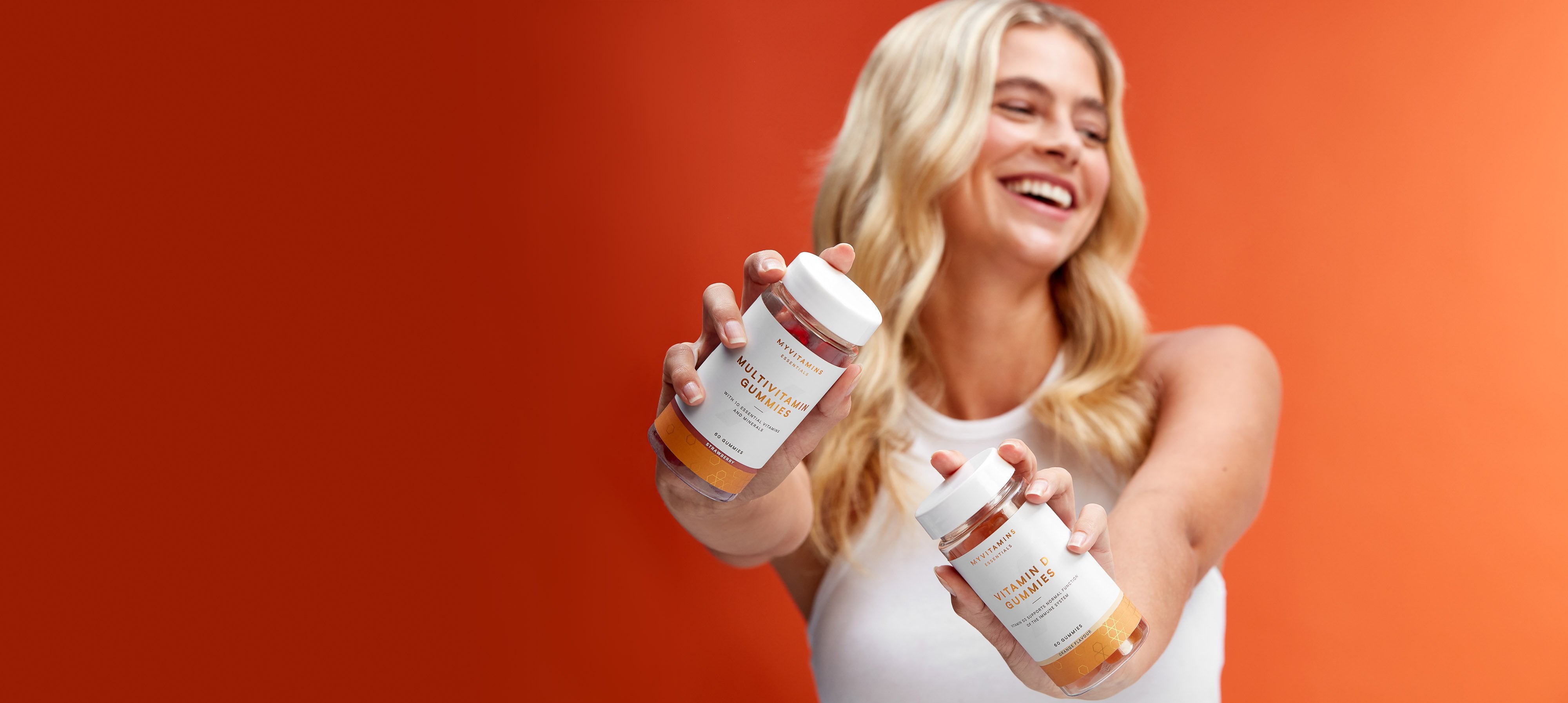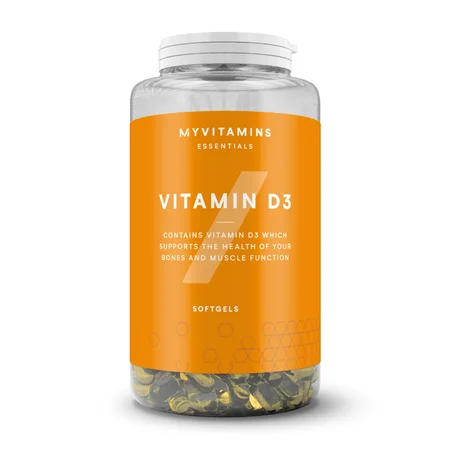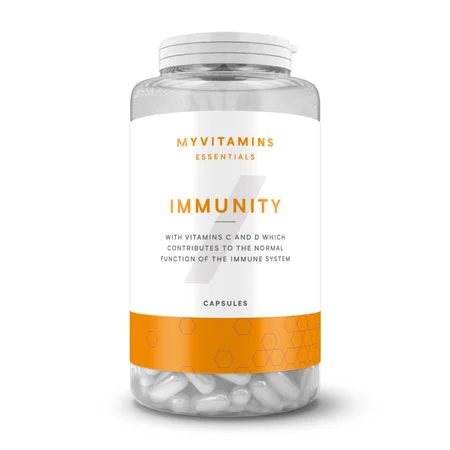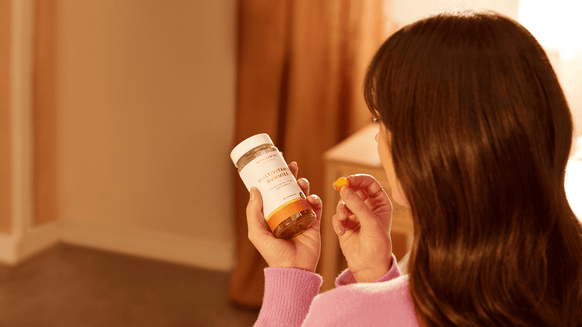Beginner’s Guide To Vitamin D: Benefits, Dosage & More

Vitamin D, also known as the ‘sunshine vitamin’ is a commonly taken supplement with increasing popularity. With numerous benefits for immunity, bone health and mental wellbeing, vitamin D supplementation is an essential part of any wellness routine.
Read on to discover more about vitamin D supplements, the benefits of vitamin D, and how to supplement safely.
What is Vitamin D
Vitamin D is an essential, fat-soluble vitamin. Fat-soluble vitamins are absorbed along with dietary fats, and are stored in the liver and body fat.
Within food and supplements, there are two forms of vitamin D: vitamin D2 and vitamin D3. It is most often found in the form of vitamin D3, otherwise known as cholecalciferol. Both forms occur naturally and are synthesised through exposure to ultraviolet-B (UVB) rays in sunlight. However, vitamin D2 is synthesised in plants and fungi, whereas vitamin D3 is synthesised in humans and other animals.
Both forms of vitamin D can be used to fortify foods. However, research suggests that vitamin D3 is superior for raising vitamin D levels within the body. Thus, vitamin D3 has become the prominent form used in supplements and fortified foods (1).
Benefits Of Vitamin D3
As an essential vitamin, vitamin D3 has a wide range of functions and benefits. The most vital roles of vitamin D are its involvement in calcium absorption and immune system function.
Calcium Absorption
Vitamin D enhances the body’s ability to absorb calcium from the diet. Vitamin D is required for adequate amounts of the hormone calcitriol. Without this, calcium absorption suffers, and the body draws calcium reserves from the bones and skeleton (2).
Healthy Bones and Joints
With calcium being drawn from the skeleton in the absence of vitamin D, this can lead to weakened bones. It may also prevent the growth of strong new bones, and increases risk of osteoporosis. Research also shows a correlation between vitamin D intake and reduced risk of arthritic pain and joint conditions. Therefore, vitamin D is vital for healthy bones and joints (2).
Immune Support
Vitamin D enhances the body’s immune response, enabling us to better fight off bacteria and viruses. Adequate vitamin D levels helps to improve the function of specialised white blood cells, such as T cells and macrophages. These work to defend the body against pathogens and keep us healthy (3).
Mood Regulation
Research suggests that vitamin D is important in the regulation of mood. Sufficient vitamin D levels may improve symptoms in individuals experiencing negative emotions such as anxiety and depression (4).
Vitamin D3 Sources
The best source of vitamin D is sunlight. However, some foods and fortified food choices may also provide varying levels of vitamin D. Furthermore, supplements may be utilised to reduce risk of nutritional shortfalls.
Food Sources
Vitamin D3 can be found naturally in a few animal-based foods. Many plant-based foods are also fortified with vitamin D3. The top food sources of vitamin D include:
- Cod liver oil
- Salmon
- Tuna
- Beef liver
- Egg yolks
- Fortified orange juice
- Fortified cereals
- Dairy and fortified plant-based alternatives
Sunlight
Sunlight exposure is the best way to obtain adequate vitamin D levels. Vitamin D3 is synthesised in the deeper levels of human skin when a steroid known as 7-dehydrocholesterol (7-DHC) absorbs UVB light. This is then transformed into vitamin D (5).
In spring and summer, around 10 minutes of sunlight daily ensures adequate vitamin D synthesis. However, in the colder months, it is not so easy to obtain vitamin D3 from sunlight.
Supplements
Supplementing with vitamin D3 is a safe and convenient way to ensure you are obtaining adequate amounts daily. In lower light through the autumn and winter months, supplementing helps us maintain healthy vitamin D levels.
Vitamin D Gummies and Vitamin D3 Softgels are two high-quality supplement options offering 25ug of vitamin D3 per dose. Designed to support the immune system and healthy bones and teeth, these offer an easy way to support your natural vitamin D levels.
Vitamin D3 Dosage
For children and infants under 1 year of age, a vitamin D supplement may be necessary. Between 8.5 and 10ug per day is advised for infants who are breastfed, or those who are consuming less than 500ml of formula per day. Formula milk is fortified with vitamin D, iron, and other essential nutrients. Vitamin drops specifically formulated for infants are recommended.
The recommended daily amount of vitamin D3 for adults and children over 1 year of age is 10ug. In autumn and winter when sunlight is weaker, it is advised to supplement with vitamin D3. With many individuals finding it difficult to source enough vitamin D from the diet, supplementing reduces the risk of nutritional shortfall.
In spring and summer, many adults and children can obtain adequate amounts of vitamin D from exposure to sunlight. However, continuing to supplement is still considered safe. It is never recommended to consume over 100ug of vitamin D3 per day.
Older adults over the age of 65 are also recommended to take 10ug of vitamin D3 per day. Older adults who may not spend so much time outdoors, or who live in a care home are at a higher risk of vitamin D deficiency. Bone becomes thinner and weaker with age, meaning risk of osteoporosis increases over time. Supplementing with vitamin D can ensure calcium is being absorbed optimally.

Potential Side Effects
With an excess of water-soluble vitamins, the kidneys work to flush these out of the body in order to keep vitamin levels stable. In comparison, excess amounts of fat-soluble vitamins, such as vitamin D, are stored in the body. This means that fat-soluble vitamins and vitamin D can more easily build up in the body. However, an individual would need to obtain a very large dose of vitamin D in order to reach dangerous or toxic levels.
Symptoms of vitamin D toxicity include:
- Elevated blood calcium levels
- Nausea and vomiting
- Diarrhoea or constipation
Talk To Your Doctor
Myvitamins are not making any medical claims in this article. If you are concerned about your vitamin D intake or supplementation, speak to your GP.
Take Home Message
Vitamin D3 is an essential vitamin with a wide variety of benefits and functions. Benefits include supporting calcium absorption, maintaining healthy bones and joints, reinforcing the immune system, and regulating mood.
Vitamin D3 is best obtained from exposure to sunlight, however vitamin D supplements may be necessary for adequate levels. 10ug per day is the recommended daily amount of vitamin D3 required for optimal health.
If you obtain too much vitamin D, you may experience uncomfortable and potentially dangerous side effects. Therefore, if you are looking to implement vitamin D3 into your daily wellness regime, consider speaking to your GP.
FAQs
What is taking vitamin D3 good for?
Vitamin D3 is essential for enhancing calcium absorption, maintaining healthy bones and joints, supporting the immune system, reducing risk of disease, and regulating mood.
Can you take vitamin D3 every day?
Yes, it is safe to take vitamin D3 daily.
When is the best time to take vitamin D3?
It is best to take your vitamin D3 supplement alongside a meal with a source of fat, as vitamin D is fat-soluble.
Can too much vitamin D3 be harmful?
As vitamin D is a fat-soluble vitamin, it is stored in the liver and body fat. Therefore, vitamin D levels can build up in the body which, although rare, can be dangerous.
What are the side effects of vitamin D3?
Side effects of too much vitamin D3 include elevated blood calcium levels, nausea, vomiting, diarrhea, constipation and low mood
When should I take vitamin D3, morning or night?
There is no research to suggest that taking vitamin D3 at any particular time of day is best. However, many people find incorporating supplements into a morning routine helps make the practice easier to remember.











